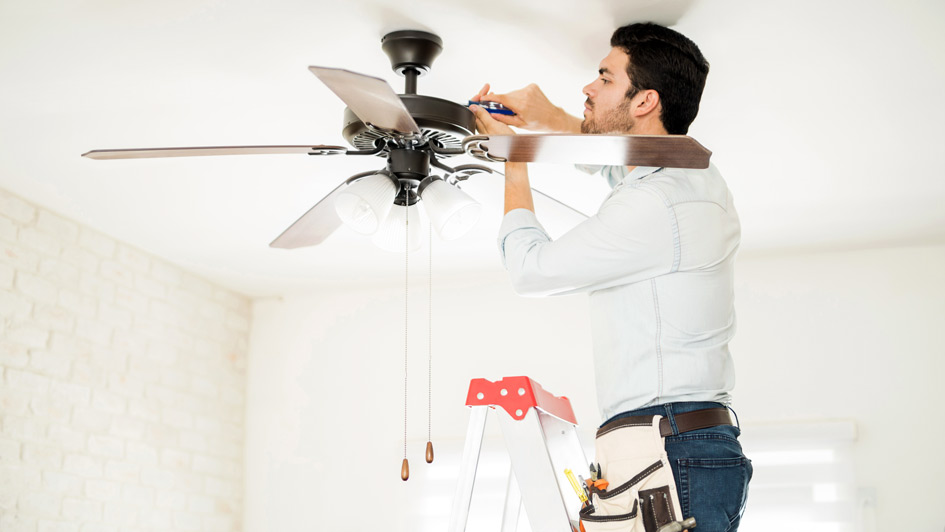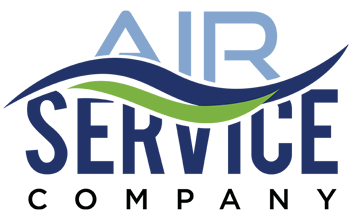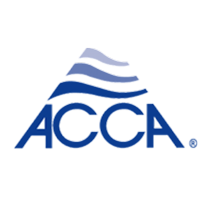
Ceiling fans are one of the most overlooked ways to make your home more comfortable and cut energy costs. By improving air circulation and working in conjunction with your HVAC system, ceiling fans and energy efficiency are truly a match made in heaven. They offer a practical, cost-saving way to maintain your comfort in hot weather while easing strain on your AC—helping you avoid unnecessary air conditioning repair.
In this blog, the experts at Air Service Co. explain how ceiling fans can keep you cool while avoiding energy waste with increased HVAC efficiency. We'll also offer some HVAC efficiency tips that take advantage of ceiling fans.
Comfort vs. Temperature: The Effect of the Wind-Chill Effect Indoors
Ceiling fans don’t actually cool the air—they make you feel cooler by moving air over your skin. This is referred to as the wind-chill effect, and it can make a room feel up to 4 degrees cooler without lowering the thermostat. That means you remain cool and enjoy the benefits of indoor air circulation from your ceiling fan while using less AC—helping reduce your electric bill in summer.
The Best of Both: Why You Should Use Fans and Air Conditioning Together
There are several benefits to using ceiling fans and air conditioning in tandem, especially on hotter days. By pairing both, you increase HVAC efficiency and maintain a comfortable indoor temperature with less effort from your cooling system.
Top perks of using ceiling fans and AC together:
- Ceiling fans help lower HVAC load by moving cool air more evenly throughout a room. Decreasing HVAC stress is important, because it can save you from a breakdown that could result in premature AC or furnace installation.
- Using ceiling fans improves your indoor comfort by eliminating hot spots and improving air movement.
- Pairing ceiling fans and AC can reduce overall energy use. If you have a home automation system, you can even adjust your smart thermostat settings to increase the temperature slightly while your ceiling fan is running.
Clockwise vs. Counterclockwise Ceiling Fan Rotation: Which Direction Should a Fan Spin?
To get the most out of your ceiling fans year-round, it’s important to make sure the blades rotate in the proper direction for the season. The direction influences how air flows, which can either cool you down or gently recirculate warm air so you feel warmer.
When it's best to spin ceiling fans counterclockwise
When it's hot outside, ceiling fans should rotate counterclockwise at a higher speed. This creates a breeze that moves air toward the floor, increasing the wind-chill effect and causing you to feel cooler.
When to rotate ceiling fans clockwise
On cold days, set your fan to rotate clockwise on a low speed. This softly moves cold air up and circulates heated air down to where you can feel it, making the space feel cozier without adjusting your thermostat.
What Type of Ceiling Fan Is Best
Choosing the right ceiling fan depends on a few critical considerations, including blade design, airflow rating and room dimensions. First, look for fans with a good combination of ECFM airflow and blade pitch to ensure efficient air movement in your space:
- ECFM refers to how much air a fan circulates—the cubic feet per minute, or CFM—per watt of electricity it uses. Fans with greater ECFM are the most energy efficient.
- Blade pitch refers to the incline of the blades. A sharper blade pitch moves more air than a shallower pitch but can also strain the motor.
Also, consider room size when sizing a ceiling fan—a fan that’s too small won’t move as much air as you'd like, while one that’s too large may be too strong for the space.
Boost Your HVAC Efficiency With the Experts from Air Service Co.
At Air Service Co., our HVAC specialists can help you enjoy year-round comfort while reducing strain on your heating and cooling systems. From energy-saving ceiling fan tips and air conditioning installation to smart thermostats and furnace repair, we offer comprehensive solutions that work with your budget. Schedule your appointment by calling 918-215-7608 today.


